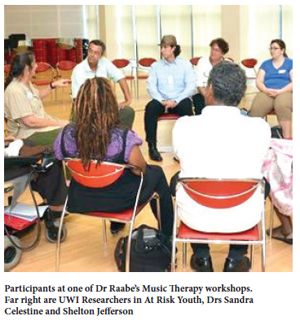
 It’s a profession that struggles for validity. Jean Raabe is passionate about the field and regrets that ‘in spite of the wealth of research that proves music therapy is effective as a treatment modality, the profession still struggles for wide-range understanding and respect’. It’s a profession that struggles for validity. Jean Raabe is passionate about the field and regrets that ‘in spite of the wealth of research that proves music therapy is effective as a treatment modality, the profession still struggles for wide-range understanding and respect’.
Raabe first came to Trinidad & Tobago in 1993 on a Fulbright-Hayes Summer Study Abroad, hosted by The UWI. It was then that she fell in love with the steel pan and purchased a used one. Since that early introduction, she’s been a part of 15 Carnival seasons and Panoramas playing with Phase II steel band and, more recently, also with the youth-oriented, smaller Highlanders.
In 2002 she decided it was time to give back and offered to do guest lectures at The UWI’s Department of Creative and Festival Arts. Student response was so positive that it turned into a semester-length course that gives participants an idea of what it would be like to study music therapy. In 2005, she began conducting workshops in secondary schools and at the Mt Hope Medical School. The first music therapy course, MUSC 3503 – Music Therapy was presented to music students in 2009 - no pre-requisites required. One year later, the first non-music majors took the elective course and now its student population comprises 1/3 non-music majors and 2/3 music majors.
Music therapy is defined as “the clinical and evidence-based use of music interventions to accomplish individualized goals within a therapeutic relationship by a credentialed professional who has completed an approved music therapy programme.” The music therapist assesses the client’s emotional well-being, physical health, social functioning, communication abilities and cognitive skills through musical responses and designs music sessions based specifically on individual needs. The music therapist then participates in interdisciplinary treatment planning, evaluation and follow-up.
According to the literature, music therapy is for persons of any and every age who have mental health needs, developmental and learning disabilities, Alzheimer's disease and other age related conditions, substance abuse problems, brain injuries, physical disabilities, and acute and chronic pain, including mothers in labour.
Hospitals use music therapy to alleviate pain, elevate patients’ moods, promote movement for physical rehabilitation, to calm or sedate and to counteract depression, fear or apprehension. In psychiatric facilities, music therapists help patients to explore personal feelings and make positive changes in mood and emotional states. It gives them a sense of control over life through successful experiences and enables them to practice problem solving and working co-operatively with others. It also helps them learn how to resolve conflict, which leads to stronger family and peer relationships.
Jean Raabe has been a Board Certified Music Therapist (MT-BC) for three decades, working primarily with children and adolescents in psychiatric care facilities. She has a Bachelor of Music in Music Therapy (Western Michigan University) and a Master of Education and Master of Business Administration (Regent University). She is currently a part-time lecturer at The University of the West Indies – Department of Creative and Festival Arts and started to integrate the steel pan into her music therapy practice 18 years ago. For more information, please contact Jean Raabe, MT-BC, jean.raabe@sta.uwi.edu |





